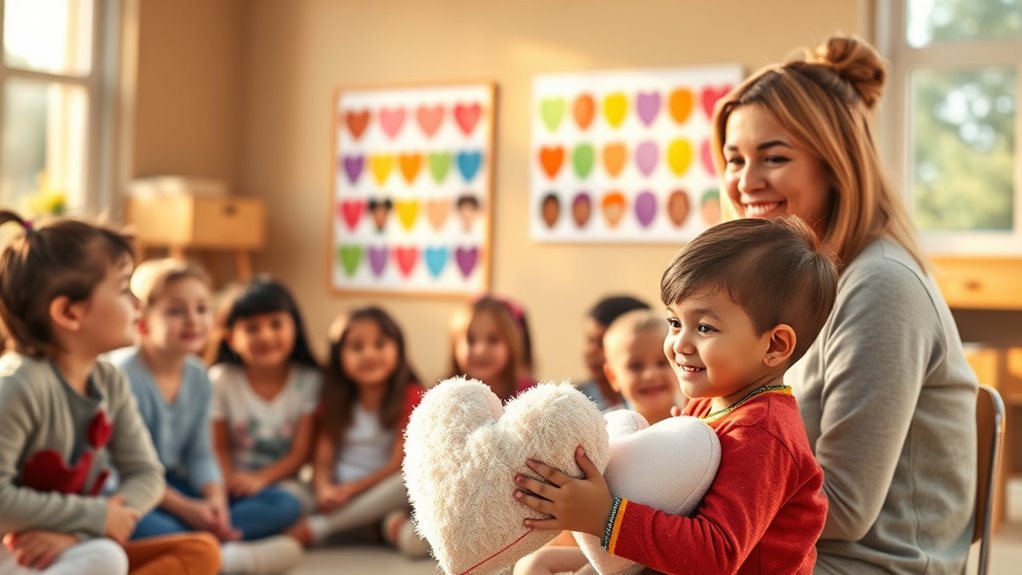To encourage emotional intelligence in children, focus on helping them recognize and express their feelings by paying attention to facial cues and labeling emotions clearly. Model empathy and calm emotional regulation yourself, creating a safe space for them to share emotions openly. Use engaging activities like stories or role-playing to boost understanding and compassion. Consistently nurturing these skills will deepen their empathy, self-awareness, and social skills, so continue exploring effective strategies to support their emotional growth.
Key Takeaways
- Model empathetic behavior and demonstrate healthy emotional regulation yourself.
- Use questions and discussions to help children identify and label their feelings.
- Create a safe, supportive environment that validates children’s emotions without judgment.
- Incorporate engaging activities like role-playing and story reading to teach emotional understanding.
- Encourage perspective-taking to develop empathy and foster emotional awareness in social situations.

Teaching children to recognize and manage their emotions is fundamental for their overall development. When you focus on helping them develop empathy and improve their emotion recognition skills, you’re setting the foundation for healthier relationships and better social understanding. Empathy development starts with guiding your child to see things from others’ perspectives. Encourage them to consider how someone else might feel in different situations, and model empathetic behavior yourself. For example, if they see a friend upset, you can ask, “How do you think they’re feeling?” or say, “It looks like they’re sad. What do you think you could do to help?” This helps your child understand that emotions are signals that need attention and understanding, fostering their ability to empathize genuinely. Passive voice detection can be used to identify sentences where the emphasis is placed on the action rather than the doer, helping you refine your writing for clarity and engagement.
Teaching kids empathy helps them understand emotions and build stronger relationships.
Emotion recognition is another pivotal skill that you can nurture through everyday interactions. Pay close attention to your child’s cues—facial expressions, tone of voice, body language—and point them out. When they’re happy, acknowledge it: “You’re smiling because you’re excited about your game.” When they’re upset, help them label their feelings: “It looks like you’re frustrated because your puzzle isn’t fitting together.” By naming emotions, you help your child connect feelings with specific words, making it easier for them to recognize and communicate their own emotions. This process not only improves their emotional vocabulary but also boosts their self-awareness and self-regulation.
Creating a supportive environment where your child feels comfortable expressing their feelings is key. When they share their emotions, listen attentively without judgment. Validate their feelings by saying things like, “It’s okay to feel angry when things don’t go your way,” which teaches them that all emotions are acceptable and manageable. When they see you handling your own emotions calmly and openly, they learn by example. This modeling encourages them to practice emotion regulation, which is an essential aspect of emotional intelligence.
Additionally, incorporate games and activities that focus on emotion recognition and empathy. Play charades with emotions, read stories that highlight characters’ feelings, or discuss scenarios and ask how they would feel and respond. These activities make learning about emotions engaging and practical, reinforcing their understanding. By consistently nurturing these skills, you’re helping your child develop emotional intelligence that will serve them well throughout life, from forming meaningful relationships to managing stress and challenges effectively.
Frequently Asked Questions
How Early Can Children Start Developing Emotional Intelligence?
You can start fostering emotional intelligence in children as early as infancy. Early emotional awareness begins when you respond to their cues and needs, strengthening parent-child bonding. As they grow, encourage them to identify and express feelings, which helps build empathy and self-regulation. By engaging in these early interactions, you lay a foundation for healthy emotional development, making your child more aware, empathetic, and resilient over time.
What Are Common Signs of Low Emotional Intelligence in Kids?
Imagine a child struggling to share their toys or easily getting frustrated—these are signs of low emotional intelligence. You might notice poor emotion regulation, like tantrums or shutting down when upset. They may also show little empathy development, ignoring others’ feelings. Recognizing these signs helps you step in early, guiding them to understand emotions better, fostering healthier relationships and stronger emotional skills over time.
How Does Emotional Intelligence Impact Academic Performance?
You’ll find that emotional intelligence boosts academic performance by enhancing emotional awareness and social skills. When kids understand their feelings and recognize others’ emotions, they can better manage stress, stay focused, and collaborate effectively. This leads to improved classroom behavior, stronger relationships with teachers and peers, and a more positive learning environment. As their social skills grow, they become more confident learners, ultimately excelling academically and developing essential life skills.
Can Emotional Intelligence Be Improved in Older Children?
Yes, you can improve emotional intelligence in older children. For example, if a child struggles with emotional regulation after a disagreement, teaching them techniques like deep breathing helps. Focus on developing their social awareness by discussing feelings and perspectives. With consistent support and practice, older children can enhance their emotional skills, leading to better relationships and resilience. It’s never too late to help them grow emotionally.
What Role Do Peers Play in Developing Emotional Skills?
Peers play a significant role in developing emotional skills by influencing your child’s friendship skills and emotional understanding. Through peer interactions, your child learns empathy, conflict resolution, and emotional regulation. Peer influence offers real-world practice in managing emotions and building trust. Encouraging positive peer relationships helps your child develop better social and emotional skills, which are essential for their overall emotional intelligence and healthy development.
Conclusion
By nurturing your child’s emotional intelligence, you’re opening the secret to a superhero who can conquer any challenge life throws at them! Imagine transforming your little one into an unstoppable force of empathy, resilience, and understanding—able to navigate storms and sunshine alike. So keep encouraging those feelings, because with your guidance, your child will grow into a mighty, emotionally savvy hero capable of changing the world one smile at a time!









